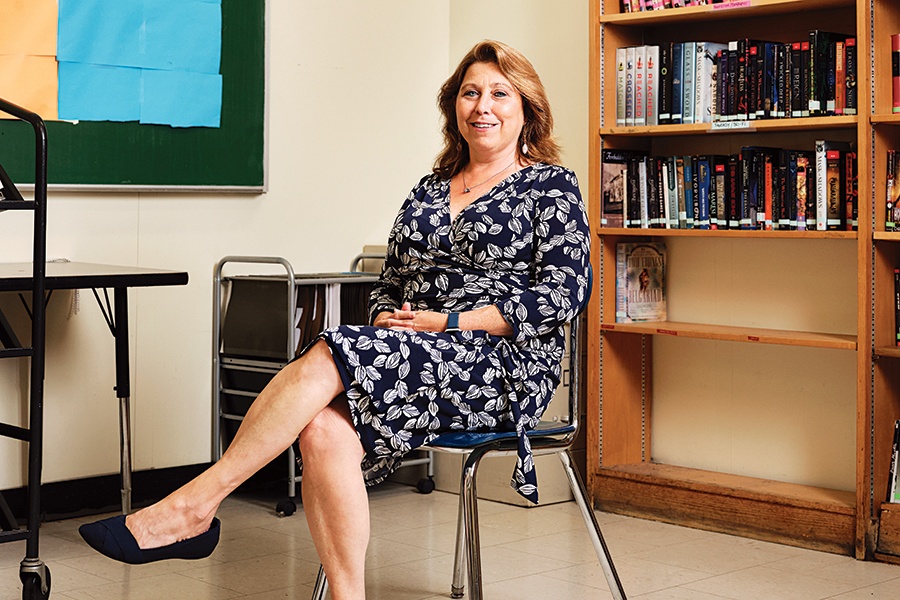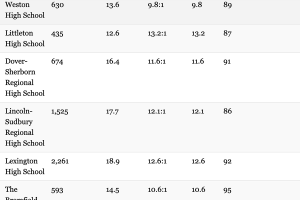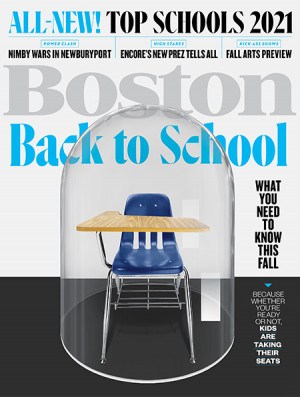The Interview: Boston Public Schools Superintendent Mary Skipper
Now at the helm of a beleaguered BPS, new superintendent Mary Skipper is determined to make the grade.

Photo by Cody O’Loughlin
When Mary Skipper was a child, a life-threatening allergic reaction to penicillin kept her out of school for so long that she struggled with spelling, even as a teenager. That doesn’t seem to have affected her ascendant career in education: For seven years, she headed the Somerville school system and, before that, founded TechBoston Academy, which President Obama hailed as a national model. Now the longtime Dorchester resident and former Latin teacher has taken on her biggest challenge yet, as she assumed the role of Boston Public Schools superintendent in late September. She’ll have her work cut out for her as she attempts to steer BPS in the right direction after the state threatened to take over the district this year. On the eve of her taking the reins, we sat down with her to talk free lunches, trips to the principal’s office, and the future of the city’s schools.
What’s the biggest challenge you anticipate on day one?
I think one of the things we’re working through as a large district is that since the pandemic, a lot of people have re-evaluated their lives and made decisions in the opposite direction from teaching, choosing to try other options and move on. In general, there’s instability in the field right now, not just here in Boston but nationally. I see that as a challenge. We want to have steady staff, a staff we can develop and invest in. We need to show young people what a rewarding career teaching is, to have them feel valued and respected.
Do you think teachers should be among the highest-paid professionals in our society?
Not just teachers and educators, but also the paraprofessionals and counselors—the folks who are working in the classrooms and school systems with our students and their families—I think that they should all be compensated really well. But I think it comes down to more than money. It’s also about showing that we value them in other ways and that we’re willing to invest in them. What they’re looking to learn. How they want to grow. Being able to develop opportunities for them, so they can follow their dreams.
Are you as infuriated as I am when public school teachers have to pay out of pocket or launch a GoFundMe campaign to get basic supplies?
Teachers shouldn’t have to struggle to have the basics of what they need in their classrooms. That’s the district’s and the city’s responsibility, not something to be put back on the individual teacher. The district’s systems and structures need to be strong to ensure that supplies, curriculum, and all the basics are provided and that students and teachers have a safe, clean, healthy environment. This was in the Green New Deal, and I’m really excited about that because it’s an opportunity to bring our buildings up to a standard that any of us would want our kids in…there’s an opportunity to just do a whole lot with our city, and with this mayor, that hasn’t existed in the past.
One of the things that you obliquely referred to is safety in schools. With so many school shootings of late, has that become a more important part of your job?
No matter what role you have in education, the safety and well-being of our students are always the priority. Parents are entrusting us with their children. It’s a complex topic because I think there are a lot of mental health issues involved, and they’ve been exacerbated by the pandemic. We have solid plans in place to make sure that if there were to be a crisis or emergency, we’re able to respond. Boston Public Schools put a ton of resources into this. And we also do rehearsals. We do drills so that students, if they need to go into a safe mode or lockdown, know what to do to keep themselves safe.
How are you dealing with the alarming mental health crises among kids today?
Making sure that our individual students are cared for, as a whole child, is crucial. We often talk about academics, but just as important are mental and physical well-being and social and emotional learning. The best way to know what’s happening is to have a strong relationship with students, to know the signs to look out for, to make sure that if a student’s struggling, there are resources that can be attached to that scenario, or to their family, so that the situation doesn’t reach that crisis level. That’s something I think Boston has done a great job investing in, with social workers, clinicians, and threat assessments, and that will be something that I will continue to build on and invest in.
When you were in school, were you ever sent to the principal’s office?
I was! I had to think about that for a minute. I grew up in a house where everybody smoked. My mother and my aunt—they were twins—and everybody smoked. I was showing up to school, and my clothes smelled very strongly of it, so the principal asked to see me because she wanted to make sure I wasn’t smoking. I assured her I wasn’t. That definitely stuck in my mind, and it’s something that I’m sensitive to with our students, that how they dress or present, we never know the situation in their home. So it’s really important to never embarrass the student and to make sure that we always approach it with kindness and a sense of support.

Photo by Cody O’Loughlin
What was your favorite grade in school?
Probably fifth grade. I had an amazing teacher that year. She was very free-spirited. She connected with each of us as individuals, in addition to being in the classroom. She was an avid reader and loved to listen to music. She loved the musician Cat Stevens, for instance, and that’s how I know all of his music. She allowed students a lot of independent reading and then would discuss what the book was about one-on-one. And she was fun.
It’s been in the news a lot lately: banning the use of phones during school hours. Is that a good or bad thing?
I think an unhealthy switch happened during the pandemic with remote learning—the balance of social interaction was lost. When we returned from the pandemic, we saw a little uptick of conflict from social media use on phones and just a general distraction. Since the students have them and know how to use them, I think you can incorporate phones in age-appropriate ways—to complete a survey or to look something up quickly in an engaging way. But, in general, unless there’s a very constructive mechanism for using them, they can be very distracting.
Favorite all-time TV show or movie set in a school setting?
I have to be honest, I’m not a big TV or movie buff. I like to read. I’m reading a memoir called Educated by Tara Westover now. It’s about the author growing up in a family where education isn’t necessarily part of the fabric. And she is captivated by books and thinking and wants to pursue that. I find it really interesting because none of my immediate family went to college. But for me, they had a hope that I would do it differently. They supported me to make that happen. I like reading books that I can relate to or that offer a very different experience from my own.
You were a teacher of classical Latin. Should Latin be mandatory?
No, not mandatory. I’ll tell you how I ended up taking Latin. When I was in the second grade, I had a life-threatening reaction to penicillin. I swelled up, and it affected my vision for an extended period of time. I was out of school, and I missed phonics. The school would send all the work home, and I would complete it, but I wasn’t able to learn the phonics because I needed to be there and hear it and listen. As I got older in school, it became a real problem because I couldn’t spell. And when I got into middle school, one of my teachers recommended to my mother that I take Latin. I struggled so much with it because it hit me at my weakness and forced me to sound out every word. And in that process, I fell in love with it. I fell in love with the fact that it wasn’t just a language, but it had a culture and a history to it that seemed like no other. So when I went to college, I majored in it.
Thoughts on free school lunches?
I think all students should have free school lunches. I’ve seen it from all sides, including where some students are stigmatized for it. I got free lunches growing up because we were below the poverty level, and I was aware of it. So I think you remove the stigma. You make sure every kid eats healthy food that’s going to sustain them. In our day and age, we can’t guarantee that students have meals outside of school. We’re moving toward having all our schools provide universal lunch, and I think it’s something as important as other basic needs, like eyeglasses.
Boston Public Schools narrowly avoided a state takeover. Everybody likes to talk about what the district did wrong, but what do you think it did right?
I mean, I haven’t even officially started yet, but I’ve been spending time talking with the executive leadership team, the cabinet, school leaders, and many of our advocacy groups to get a big-picture understanding of where things are. There are a lot of really hardworking, dedicated people in Boston Public Schools. And some of the secondary work that’s been done in terms of math core, equitable literacy, et cetera is really awesome. I think lots of these programs are working, but the challenge is that they happen in pockets, and we want to strive for all students to have those experiences—in particular, students who have traditionally been marginalized, our Black and brown students, or students in special education, our multilingual learners. What I see is taking the bright lights in the district and making them shine everywhere.
What are the failures that led to the crisis?
Sometimes, you let go of one thing in order to focus on something else. I can’t play judge and jury about what’s taken place over the past seven years since I was last here. But what I will say is that I think there are a lot of elements for success here, and where there are gaps, that’s what we’ll be focusing on. This is really a rebuilding. My hope now is that our philanthropic, nonprofit, university, and business communities are willing to come to the table, and that’s what I’ve been seeing. Our mayor has been tremendous at galvanizing support and making it clear that schools are her priority.
How do you feel about standardized testing?
It has its place, and you learn some things from it. The difficulty with high-stakes tests is if that’s the only data point you’re using, it’s limited. We’re attempting to look at many data points to understand students’ areas of strengths and weaknesses. I’m a firm believer in organic assessment, and teachers are the closest to the students. On a daily basis, teachers are assessing, both formally and informally, why they’re seeing different outcomes and what additional support they might be able to give.
If you weren’t in education, what would you do?
I’d be in medicine. I’m a breast cancer survivor since 2002, and it had a profound impact on me. I was 35, and I had lots of changes to my body and my life that I was not anticipating at that age. But it also gave me a critical lesson in education. I could never have launched TechBoston alone because I started chemo at the same time we opened the doors of the school. I had to rely on a team, and that team included my fellow leaders, but most important, it included my teachers and my students. For me, as a leader, to recognize that no one can do this work alone, that you have to build a strong team, a diverse team, who can pick up the slack at any minute, that was the silver lining of something terrible.
Did you ever play hooky growing up in Arlington, and if so, for what?
I never did because my mother put the fear of God in me very early on. My mother was a food-service worker in the schools I went to, and my uncle drove the food-service truck. We lived with my aunt and uncle in a very tiny two-bedroom duplex, so I would have been caught. There was no way I was going to be absent without somebody noticing it.

Photo via Floortje/Getty Images
By the Numbers
The Math of BPS
A numerical look at the state’s oldest and largest school system.
1647
Year the Boston Public Schools system was founded, making it the first in the nation.
138
Number of different countries BPS students hail from.
25,853
Average number of lunches served at BPS every day during the 2021 to 2022 school year.
24
Number of principals of the 119 BPS locations who are new this academic year.
1/5
Fraction of the roughly 49,000 total BPS students who have a disability.

